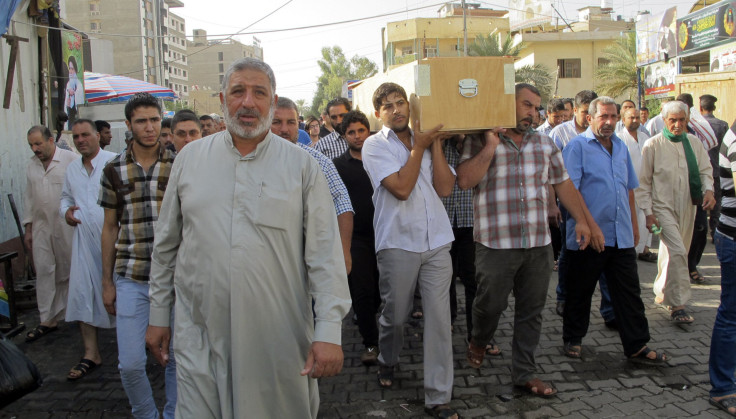ISIS: Baghdad Bombings Suggest Islamic State Militants Have Advanced

The Islamic State group has purportedly carried out attacks to the south of Baghdad, suggesting that the Sunni militant group (also known as ISIS) has surrounded the city on three sides -- an unprecedented advance and the first of its kind since the group began its advance from Mosul in June.
The set of coordinated attacks, which took place over two days inside the capital, killed at least 60 people and wounded more than 100. Although ISIS has not formerly claimed responsibility for the bombings, it has been widely reported by security officials in the capital that the group is responsible.
In the past two months, ISIS has gained the support of Sunnis who have begun fighting alongside the group in urban warfare similar to what Al Qaeda waged more than 10 years ago. Reuters reported last month that the Islamic State militant group was using tunnels built by Saddam Hussein to the south of Baghdad to get closer to the capital.
Until now, ISIS has for the most part stalled its offensive in Salahadin province near Samarra. The group has maintained its position in the Baghdad belt, trying at times to infiltrate the capital, but receding after clashing with Iraqi security forces. Since beginning its initial march toward Baghdad in June, ISIS has established strongholds in Iraqi Kurdistan north and west of Kirkuk, the oil capital of the region, and closer to Baghdad in Taji and Abu Ghraib.
Thursday’s attacks took place in the neighborhood of Kadhimiya in Baghdad, which is predominantly Shiite—a new gain for ISIS, which is known for taking over predominantly Sunni areas. Early in the day 16 people were killed by explosions and a mortar attack. Later, two car bombs detonated and killed at least 24 people. Then, mortar rounds fired in the same area killed five more.
On Friday, a series of car bombs exploded, killing at least 22 people. One car bomb exploded near a Shiite mosque in Karradah. Two others exploded in outdoor markets in the Shiite suburb of Nahrawan and Bayya district. South of Baghdad another bomb exploded in the town of Mahmoudiya.
The attacks in Baghdad and the surrounding suburbs could indicate that the Sunni militant group is ramping up its efforts to infiltrate the city before the new group of U.S. military advisers arrives over the next few days. According to a Pentagon spokesman, the additional advisers are expected to be in Baghdad Saturday.
On Sept. 10 President Obama ordered an additional 475 U.S. personnel to Iraq and said they would advise and assist the Iraqi military in its fight against ISIS.
There are currently a total of 1,090 U.S. personnel in Iraq, according to the Pentagon, 780 of which are U.S. military security forces. The U.S. has so far set up two joint operation centers -- one in the north and one in Baghdad. The Pentagon did not give the location of the operations center in Baghdad, though it is most likely located in the Green Zone.
The 475 personnel headed to Iraq on Saturday will assist the personnel already in the country. Some will join the advise-and-assist mission, while others will join one of twelve teams embedded with the Iraqi military.
So far the U.S. has conducted 178 airstrikes against ISIS in Iraq. The majority of those airstrikes have focused on ISIS convoys in Iraqi Kurdistan near Erbil. But over the past two days the airstrikes have landed near Baghdad. According to the U.S. Central Command, one airstrike hit southeast of Baghdad near Karadah. The strike hit a boat on the Euphrates River conducting the resupply of ISIS forces. A second strike hit an ISIS ground unit in the area.
© Copyright IBTimes 2024. All rights reserved.





















